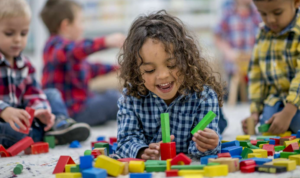|
Getting your Trinity Audio player ready...
|
Playtime is often perceived as mere fun and games for children, but its significance in shaping their development cannot be overstated. Play is a crucial avenue through which children explore, learn, and develop essential skills that form the foundation for their future growth. In this blog post, we take a look at how playtime shapes child development, from cognitive and social skills to emotional and physical well-being.

Unleashing Creativity and Imagination
Playtime serves as a canvas where children’s creativity and imagination run wild. Whether building castles from building blocks, engaging in imaginative role-play, or drawing fantastical worlds, creative play allows children to express themselves freely. This fosters cognitive growth as they problem-solve, innovate, and develop a unique perspective on the world around them.
Developing Cognitive Skills Through Play
Playtime isn’t just about having fun—it’s a powerful tool for cognitive development. Activities like puzzles, board games, and educational toys enhance critical thinking, problem-solving, and spatial awareness. As children engage in play, they are unconsciously developing mathematical concepts, language skills, and memory retention, all of which lay a strong foundation for their academic journey.
Social Interaction and Communication
Play is a natural arena for children to engage in social interactions and learn valuable interpersonal skills. Whether playing with peers or siblings, children learn to share, take turns, negotiate, and cooperate. Through group activities and collaborative play, they develop effective communication skills, empathy, and the ability to navigate social dynamics.
Emotional Regulation and Expression
Playtime provides children with a safe space to explore and express their emotions. Whether it’s playing with dolls, or action figures, or engaging in dramatic play, children often mimic real-life situations and emotions. This helps them process their feelings, understand others’ perspectives, and develop emotional intelligence—an essential life skill.
Physical Development and Motor Skills
Active play, such as running, jumping, and climbing, is integral to developing children’s motor skills and physical fitness. Playtime encourages gross motor development, fine motor control, and hand-eye coordination. Outdoor play also exposes them to sensory experiences, boosting their overall sensory integration.
Building Confidence and Resilience
Playtime offers children a sense of agency and control, allowing them to make decisions, take risks, and experience consequences in a controlled environment. This fosters confidence, resilience, and a healthy sense of self-esteem as they overcome challenges and develop a “can-do” attitude.
Learning Cultural and Social Norms
Through imaginative play, children explore various roles and scenarios, learning about cultural norms, societal roles, and behavioural expectations. This helps them understand their place in the world, appreciate diversity and develop a sense of cultural awareness.
Encouraging Lifelong Learning
Playtime lays the foundation for a love of learning that extends beyond childhood. As children engage in activities that pique their curiosity, they develop a natural inclination to seek knowledge, ask questions, and explore their interests—an attitude that serves them well throughout their educational journey and beyond.
Balancing Structured Play and Free Play
While structured activities have their benefits, it’s essential to strike a balance between structured play (with specific learning goals) and free play (unstructured and self-directed). Both types of play contribute uniquely to child development, offering opportunities for growth, self-expression, and joy.
Conclusion
In the enchanting realm of playtime, children embark on a journey of growth, learning, and discovery. Through creative, cognitive, social, and physical engagement, they develop a wide range of skills that shape their personalities and lay the groundwork for success in various aspects of life. As caregivers and parents, fostering a supportive environment that encourages playtime can profoundly impact a child’s overall development.

